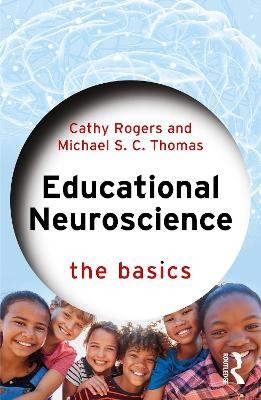
Educational Neuroscience
Routledge (Verlag)
978-1-032-02855-2 (ISBN)
Educational Neuroscience: The Basics is an engaging introduction to this emerging, interdisciplinary field. It explains how the brain works and its priorities for learning, and shows how educational neuroscience, when combined with existing knowledge of human and social psychology, and with teacher expertise, can improve outcomes for students.
Cathy Rogers and Michael S. C. Thomas reveal how neuroscientific evidence is forcing us to question our assumptions about how our brains learn and what this means for education. The chapters in this vital volume step through the brain’s priorities: processing senses and moving our bodies, emotional processing, and the difficult job of dealing with other people. It unpacks the tricky tasks of thinking and learning, considering how memory works and the many systems involved in learning. It draws this all together to offer guidance for effective classroom practice, current and future. Chapter features include key issues for special educational needs and neurodiversity, case studies of novel interventions, debunking of common neuromyths, and guidance for teachers on how to evaluate their own practice.
This book is a compact, lively introductory text for students of psychology, neuroscience and education and courses where these disciplines interconnect. It will also be essential reading for educational professionals, including teachers, heads, educational advisors and the many industry bodies who govern and train them, as well as anyone interested in the fascinating story of how we learn.
Cathy Rogers completed her PhD in Educational Neuroscience at Birkbeck, University of London, after many years spent producing science television shows. Her research interests are diverse and include the effects of digital technologies on brain development and the neuroscience of adult literacy. Her primary area of interest is in the brain basis of creativity. Michael S. C. Thomas is Director of the Centre for Educational Neuroscience at Birkbeck, University of London. His research interests are in the translation of research between neuroscience and education, establishing new transdisciplinary accounts in the learning sciences, and developing practical applications within education. He is a Chartered Psychologist, Fellow of the British Psychological Society, Fellow of the US Association for Psychological Science, and Senior Fellow of the Higher Education Academy.
Chapter 1. Why do we need educational neuroscience?
By figuring out how learning works in the messy, biological organ that’s the brain, we can help optimise the systems geared to improving it – that is, teach.
Chapter 2. I wanna walk like you…
In the classroom, learning and thinking is built on our sensory and motor systems: what happens in our heads has its origins in our bodies.
Chapter 3. I feel therefore I am
Emotions are an integral part of every thought and action. Harnessing them is a cornerstone for effective learning.
Chapter 4. No one is an island
Our brains are deeply concerned with other people, including teachers and peers. This can be the best or the worst news in the world.
Chapter 5. Thinking is hard
The brain evolved for processing senses and coordinating movements in response. Abstract thinking? That’s a whole new ball game.
Chapter 6. Learning is even harder
The brain can’t help but learn – it’s just what it does. But the sort of learning required in classrooms is just about the most complicated thing we could ask a brain to do.
Chapter 7. Fly me to the moon
Now we understand all the building blocks, how can we use this knowledge in the classroom?
Chapter 8. Covering the syllabus
There’s the general, then there are specifics. What are some of the special requirements for learning literacy, numeracy, arts and sciences?
Chapter 9. The whole system perspective
Educational neuroscience is not all about brains. It’s also about students, teachers, classrooms, schools, communities, society. It’s time to bring all those perspectives together.
| Erscheinungsdatum | 27.10.2022 |
|---|---|
| Reihe/Serie | The Basics |
| Zusatzinfo | 21 Line drawings, black and white; 9 Halftones, black and white; 30 Illustrations, black and white |
| Verlagsort | London |
| Sprache | englisch |
| Maße | 129 x 198 mm |
| Gewicht | 244 g |
| Themenwelt | Geisteswissenschaften ► Psychologie ► Allgemeine Psychologie |
| Geisteswissenschaften ► Psychologie ► Entwicklungspsychologie | |
| Geisteswissenschaften ► Psychologie ► Pädagogische Psychologie | |
| Naturwissenschaften ► Biologie ► Humanbiologie | |
| Naturwissenschaften ► Biologie ► Zoologie | |
| ISBN-10 | 1-032-02855-6 / 1032028556 |
| ISBN-13 | 978-1-032-02855-2 / 9781032028552 |
| Zustand | Neuware |
| Informationen gemäß Produktsicherheitsverordnung (GPSR) | |
| Haben Sie eine Frage zum Produkt? |
aus dem Bereich



